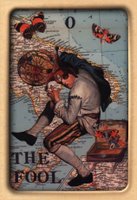SPOILING FOR A FIGHT

When I lived in Ghana and was the chairman of the campus debating society, I organized a debate on the motion, “religion is the opium of the people” and spoke in favour, with some relish. For various reasons, mostly frustration that the European Enlightenment had failed to make any inroads into their society, I wanted to give my students a nudge in the direction of atheism, or at least skepticism. My intensely devout Christian and Muslim students viewed me as an eccentric “free-thinker” and, thankfully, did not take offence. One of them even volunteered to second me! The debate passed off without incident. I was judged the winner (by a panel, not a show of hands); this was actually a foregone conclusion, as I was one of the masters.
It’s the same impulse to shove believers into modernity that causes Matthew Parris to write (in yesterday’s Times) in defence of publishing the cartoons of Mohammed:
‘But let us not duck what that “I do not believe” really means. It means I do not believe that there is one God, Allah, or that Muhammad is His Prophet. It means I do not believe that Jesus is the way, the truth and the life, or that no man cometh to the Father except by Him. I do not believe that the Jews are God’s Chosen People, or subject to any duties different from the rest of us. It means I do not believe any living creature will be reincarnated in another life.
In my opinion these views are profoundly mistaken, and those who subscribe to them are under a serious misapprehension on a most important matter. Not only are their views not true for me: they are not true for them. They are not true for anyone. They are wrong.’
Let us assume for the sake of argument that matters of religion do in fact fall into the falsifiable-by-science category (see ‘Who Lives in a Postmodern World?’ below), and therefore can be demonstrably wrong. What grounds are there for showing a deluded believer the error of his ways? Might there be any factors that would hold us back from so doing?
As far as I can see, in the case of the cartoons, there were no good grounds to publish. They are NOT going to help shift the balance of power in oppressive societies. Besides which, they may well incite religious hatred; the one with Mohammed sporting a bomb doesn’t look too dissimilar to me from the anti-Jewish cartoons in 1930s Germany. While upholding the freedom of the press to publish, we should recognize that to do so was a pretty poor decision all-round.

It looks rather like a piece of playground provocation – picking a fight. And the result has been perfectly intelligent journalists and crowds of Muslims on the street just spoiling for one – in their own different ways. It’s so exciting, isn’t it, this impending “clash of civilizations”? It’s something to talk about and it’ll sell a lot of papers, to be sure. But where are the peacemakers now? In the face of the disintegrating order, where’s Piggy to wail impotently about people “acting like a crowd of kids?”
While recognizing that satire is a powerful weapon in deflating pomposity and chipping away at the armour of authoritarian regimes, we should use our freedom to criticise people judiciously. After all, I am free to tell my overweight friend that he’s eaten all the pies. Just as I am free to discuss how diverting pornography is with my feminist colleague. I am free to tell an advertising consultant I meet at some party that he’s in an evil trade, or a committed Robbie Williams fan that his idol is a media-manufactured talentless chimp. Many of my closest friends believe passionately in astrology and I am of course free to trash their beliefs mercilessly. You get the picture. The thing is, I choose when to say these things, and often hold my tongue. It’s not hard; it’s the usual process of seeking not to give offence. It’s valued only a little and so easily scorned, but behaving respectfully is not merely a social nicety; in Ghana, and in our modern multicultural European societies, it can prevent bloodshed.
I now regret having held that debate in Ghana, and sincerely hope that I was not the catalyst in bringing anyone to give up their opium habit. I now see clearly that it was a society in a different stage of development. Belief in Providence and in the afterlife gave people a practical reason to hope, to get up in the morning and plough their fields, to strive to better their lives, to smile. And generally people in Ghana, barring personal tragedies, were happy and fulfilled, with some belief that things were going to get better for them. How could skepticism possibly improve this? It was a clear case where happiness, albeit opiated, was better than “the truth”.
Simon Jenkins: These cartoons don't defend free speech; they threaten it








